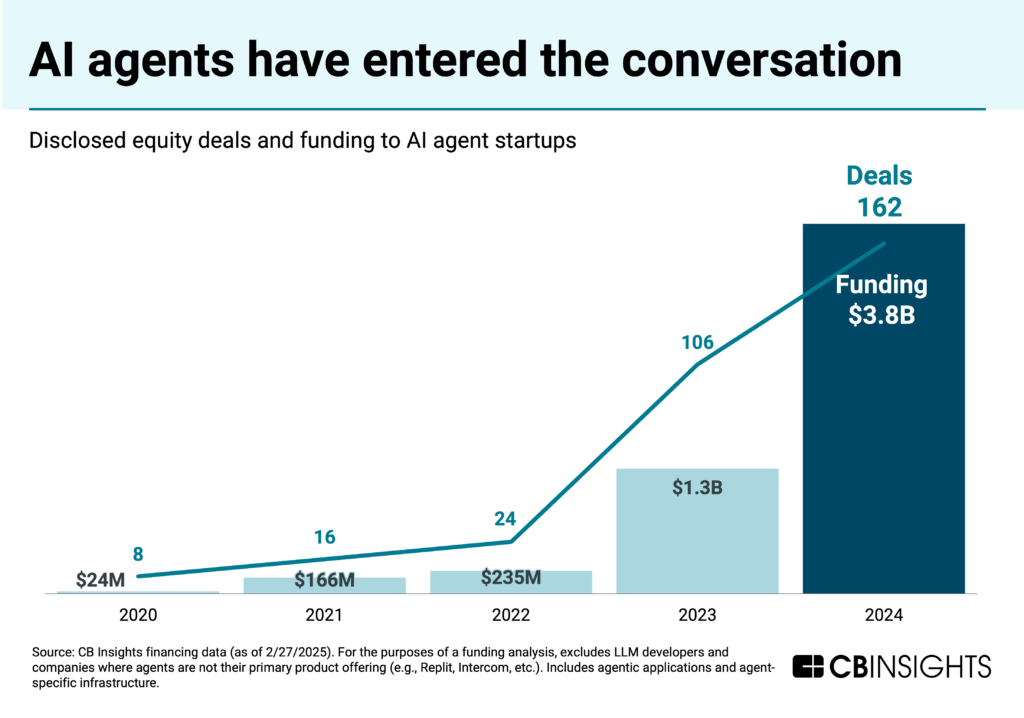From increasing specialization to rising infrastructure markets, here’s where the opportunities lie across the AI agent landscape.
AI agents are dominating the conversation. Mentions on corporate earnings calls grew 4x quarter-over-quarter in Q4’24. And they’re on pace to double again this quarter.
These LLM-based systems mark an evolution beyond copilots: AI agents can accomplish complex tasks on a user’s behalf with minimal intervention, from sales prospecting to compliance decisioning.
In the rapidly growing landscape for agent infrastructure and applications, over half of companies in the market have been founded since 2023. Meanwhile, funding to startups in the space nearly 3x’d in 2024.
Below, we outline 4 AI agent trends to watch in 2025 based on CB Insights data:
- Big tech and leading LLM developers dominate general-purpose agent use cases: Tech giants’ AI developments will make agents better, cheaper, and more pervasive in 2025, while also putting more pressure on private players. With massive distribution channels (e.g., OpenAI has 400M weekly active users) and many enterprises favoring established vendors due to lower risk, big tech companies have significant advantages in general-purpose agent applications.
- Private AI agent market moves toward greater specialization: In the increasingly crowded horizontal AI agent landscape — which has captured half of all equity deals since 2020 — successful companies are standing out in areas like customer support and coding by leveraging deeper workflow and customer data integration. Next on the horizon are industry-specific solutions, which are poised for broader deployment according to CB Insights Commercial Maturity scores.
- AI agent infrastructure stack crystallizes: The fragmented landscape is becoming more structured, with specialized solutions emerging for different aspects of agent development. Key categories include data curation, web search & tool use, and evaluation & observability, as well as full-stack AI agent development platforms — the largest infrastructure category we’re tracking based on company activity.
- Enterprises move from experimentation to implementation: Organizations are actively exploring AI agent adoption, with 63% surveyed by CB Insights placing high importance on them for the next 12 months. However, key challenges remain around reliability & security, implementation, and talent. Human-in-the-loop oversight and solid data infrastructure management can help address these concerns.
1. Big tech and LLM developers dominate general-purpose agent use cases
Tech giants and model developers are driving AI developments that will make agents better, cheaper, and more pervasive in 2025.
Model costs are dropping (~10x every 12 months), while performance gaps between open- and closed-source models are narrowing — creating tailwinds for applications like agents, which are built on top of them.
For example, advancements in voice AI models in 2024 — including the launch of OpenAI’s Realtime API for speech-to-speech applications — jumpstarted voice applications across use cases. One early sign of momentum is that companies building voice AI applications are making up a larger share of Y Combinator’s recent cohorts.
At the same time, agent launches by incumbents, big tech, and leading LLM developers like OpenAI and Anthropic will put pressure on private players in 2025.
Want to see more research? Join a demo of the CB Insights platform.
If you’re already a customer, log in here.


